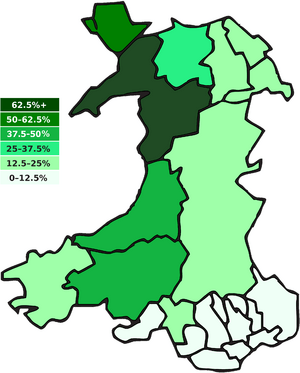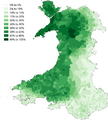Welsh language facts for kids
Quick facts for kids Welsh |
|
|---|---|
| Cymraeg, y Gymraeg | |
| Native to | Wales and Argentina. |
| Region | Spoken throughout Wales, in border-towns between England and Wales, and in the Chubut province of Argentina. |
| Native speakers | 721,700 total speakers (2011) — Wales: 562,000 speakers, 19.0% of the population of Wales, with 14.6% of the population (431,000) considering themselves fluent in Welsh — England: 150,000 — Chubut Province, Argentina: 5,000 — United States: 2,500 — Canada: 2,200 |
| Language family | |
| Early forms: |
Old Welsh
|
| Writing system | Latin (Welsh alphabet) |
| Official status | |
| Official language in | |
| Regulated by | Meri Huws, the Welsh Language Commissioner (since 1 April 2012) and the Welsh Government (Llywodraeth Cymru) |
| Linguasphere | 50-ABA |

Percentage of Welsh speakers by principal area
|
|
The Welsh language is a Celtic language. It is the national language of Wales, a country in the United Kingdom. In Welsh, the language is called Cymraeg or yr iaith Gymraeg. This means "the Welsh language".
About 21% of people in Wales speak Welsh. That's around 600,000 people. Some people outside Wales also speak it, like those in nearby England. Many Welsh people can understand or read Welsh, even if they don't speak it often.
Almost everyone in Wales can understand and use English. However, Welsh is still a very important part of Welsh culture. Children in all schools in Wales learn Welsh. Some schools teach most subjects in Welsh. Other schools teach mainly in English, and Welsh is taught as a second language.
Contents
Understanding Welsh Language Changes
Welsh has something called "mutations." This means that the first sound or letter of a word can change. These changes happen depending on the words around them.
For example, the Welsh word "gwneud" means "to do." The word "dod" means "to come." Sometimes "gwneud" changes to "wneud". And "dod" might change to "ddod". These changes also happen inside and at the end of words.
Formal and Informal Welsh
Just like in some other languages, Welsh has formal and informal ways to speak.
When to Use Formal Welsh
Formal Welsh is used in certain situations. You use it when writing important documents. It's also for speaking to a group of people. You should use it when talking to someone older than you. It's also for people you've just met or want to show respect to. Formal words often use forms of "chi," which means "you." Sometimes, people might ask you to use "chi" with them.
When to Use Informal Welsh
Informal Welsh is for talking with friends or family. You use it when sending emails or text messages to people you know well. Informal words use forms of "ti," which also means "you." People you are close to might ask you to use "ti" with them.
Learning Welsh Sounds and Phrases
Welsh has some unique sounds and letters not found in English. Two examples are 'ch' and 'll'.
Unique Welsh Sounds
The 'ch' sound is like the 'ch' in the Scottish word Loch Ness. A Welsh word using 'ch' is "bach", meaning "small."
The 'll' sound is a voiceless 'l'. You make it by placing your tongue on the top of your gums and blowing. A Welsh word with 'll' is "llan", meaning "church." This word appears in many Welsh place names. One famous example is Llanfairpwllgwyngyllgogerychwyrndrobwllllantysiliogogogoch.
Both 'ch' and 'll' are single letters in the Welsh alphabet. Other single letters include 'dd,' 'ff,' 'ng,' 'ph,' 'rh,' and 'th.'
Common Welsh Phrases
Here are some useful phrases in Welsh:
- "Croeso i Gymru" (Kroy-sore ee Gum-ree) - Welcome to Wales
- "Dewch i mewn" (Dew-ch ee mewn) - Come in (formal)
- "Bore da" (Bor-eh dah) - Good morning
- "Nia ydw i" (Nee-ah uh-doo ee) - I am Nia (My name is Nia)
- "Pwy ydych chi?" (Poi Ud-uch ee) - Who are you? or What is your name? (formal)
- "Sut ydych chi heddiw?" (Sit uhd-ich ee heth-ew) - How are you today? (formal)
- "Sut wyt ti heddiw?" (Sit ooee-tea heth-ew) - How are you today? (informal)
- "Da iawn diolch" (Dah yoww-n dee-olch) - Very well thank you.
Other Welsh Words
Here are a few more words:
- "Trwyn" (Troo-in) - Nose
- "Hapus" (Hap-is) - Happy
- "Trist" (Tree-st) - Sad
- "Rwy'n caru ti" (Rooeen carry tea) - I love you (informal)
- "Heulog" (Hey-log) - Sunny
- "Eira" (Ey-ra) - Snow
- "Ci" (Key) - Dog
Welsh in Media
Welsh books and newspapers have been printed for hundreds of years. Some Welsh books have been translated into English. Also, books from other languages have been translated into Welsh. For example, Harry Potter and the Philosopher's Stone was translated into Welsh. Its title became "Harri Potter a Maen yr Athronydd," which means the same thing.
BBC Radio Cymru is a Welsh-language radio station. You can listen to it all over Wales. Some local radio stations also have Welsh and English programs.
S4C is a Welsh television channel. It has been on air since 1982. It shows programs like the soap opera Pobol y Cwm. It also has children's shows like Superted and Sam Tân (known as Fireman Sam in English).
In 2009, the company Samsung released a new Welsh language mobile phone. It included Welsh predictive text and menus.
The Welsh Alphabet
The Welsh alphabet has some letters that are not in English. It also does not use some English letters. However, some English letters are used for sounds that cannot be made otherwise.
For example, the letter 'j' is not in the Welsh alphabet. But it is used in words like "garej" (meaning garage). The traditional Welsh word for "garage" is modurdy, which means "motor house." Another borrowed word is "toiled" (meaning "toilet"). Many borrowed words are now used in spoken Welsh.
Here is the Welsh alphabet: A1, B, C, CH2, D, DD2, E1, F2, FF2, G, NG2, H, I1, L, LL2, M, N, O1, P, PH2, R, RH2, S, T, TH2, U1, W1 2, Y1.
1 These letters are vowels. The letter 'W' can be a vowel (like the 'oo' in 'cwm' (coom), meaning 'valley'). Or it can be a consonant (like in English, for example in 'gwyn' (gwin), meaning 'white'). The letter 'I' can also be a consonant. It sounds like an English 'Y' in words like 'iogwrt' (yog-oort), meaning 'yoghurt'. 2 These letters are not in the English alphabet, or they have different sounds.
- CH sounds like 'kh' in 'Ayatollah Khoumeini'.
- DD sounds like the 'th' in 'there'.
- F sounds like the English 'V'.
- FF sounds like the English 'F'.
- NG sounds like it does in English, but it can appear at the start of words (e.g., 'fy ngardd' - my garden).
- LL sounds like a cat hissing.
- PH sounds like the English 'F', but it is only used in mutations.
- RH sounds like an 'R' said very quickly before an 'H'.
- TH sounds like the 'th' in 'thin'.
- W is explained above.
Images for kids
See also
 In Spanish: Idioma galés para niños
In Spanish: Idioma galés para niños








